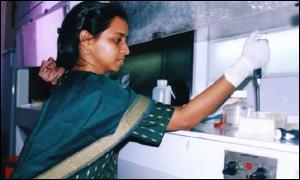
Indian firms embrace biotechnology
URL: http://news.bbc.co.uk/hi/english/world/south_asia/newsid_1264000/1264569.stm
Date accessed: 9 April 2001
Friday, 6 April, 2001, 18:52 GMT 19:52 UK
After India's software revolution, biotechnology is being described as the next big thing to hit the country.
Multinational and Indian research companies are investing heavily in the industry, encouraged by biotechnology-friendly policies.
Politicians and policy makers believe that as well as creating wealth, the growth in biotechnology may bring medical and ecological breakthroughs.
Biotechnology, like IT, is knowledge intensive. This gives India's highly qualified, English speaking but relatively cheap work force a real commercial advantage.
Biotech strategies
Overseas investors are drawn by India's enormous natural resources.
Tamil Nadu alone has 5,000 species of flowering plants and 22,500
square kilometres of forests.
|
|
|
Mr Swaminathan was the creator of India's "green revolution", a scheme that massively increased crop yields in the late 1960s. He believes that by improving infrastructure and encouraging investment "socially beneficial" biotechnology can flourish.
"We will invite entrepreneurs, non-resident Indians, or even outsiders," he said. "We welcome anyone who shares our vision of reaching the unreached, or including the excluded in terms of technological benefit."
Facilities being built to attract businesses include a biotechnology park near Madras, medicinal plants laboratories near the temple-town Madurai, and a marine centre in the south of the state.
An existing women's biotechnology park, on the outskirts of Madras, will continue to be supported by the government, and a Bioinformatics and Genomics Centre will be opened at the state's main IT industrial park.
Natural resources

Prof Swaminathan was the creator of India's 'Green
Revolution'
|
The area also has a sizeable section of India's 7,500 km coastline. It is part of the ecological treasure trove that is the basis of much of the local biotechnology.
An estimated 60% of the world's population live within 60 km of the sea. For them, global warming is a real threat to food security.
Topsoil will be washed away leaving marshy saline soil, an environment in which conventional crops won't grow. It's a problem researchers at the M S Swaminathan Research Foundation are trying to resolve.
"Our scientists have mapped mangrove trees. They grow in the estuaries, between seawater and fresh water and they have genes for seawater tolerance. We have identified those genes and transferred them to a number of crops, including mustard, tobacco, pulses and rice," says Professor Swaminathan.
In medicine as well as agriculture, India's ecosystem has much to offer. Many Indian tribes turn to traditional healers who use locally found plants to treat diseases.
Biopiracy

There is a women's biotechnology centre outside Madras
|
This "biopiracy", which for many people is nothing less than the theft of indigenous resources and know-how, is being combated to some extent in the courts. But there is real concern about the motives of the multinational companies who are investing in India.
In a recent report, the Confederation of Indian Industry said the national market in biotechnology was now valued at $2.5 billion, a fivefold increase since 1997. By 2010, the Indian industry could be worth $4.5 billion.
It may be small fry compared to the United States, which has an annual biotechnology turnover of $20 billion, but India is now a major player in the global industry.
Resisting change
But some industrialists choose to ignore the option of biotechnology.
MV Subbiah is the chairman of a large family-owned industrial firm, the Murugappa Group.
Over the past 10 years, his company has been using tissue culture to maximise yields, and increase disease resistance in sugar cane.
But he says that after much consideration, his family have decided not to invest in biotechnology.
"The modification of a gene and what it will lead to is one of the biggest ethical questions we have, and nobody has the answer to it," he said.

Last year, India tried to prevent a US company
patenting basmati ice
|
"Therefore we believe the same thing will happen here, and the extraordinary biodiversity that we have will be lost to this country."
Domestically produced GM crops haven't yet hit the Indian market place, and in theory it is illegal to import transgenic foods.
But in practice, GM crops are finding their way into the country thanks to inadequate testing facilities at some Indian ports. There is very real public concern about both the GM crops arriving in India and local research.
With the development of a large and powerful domestic biotechnology industry, these concerns will only increase.
Activists calling for tighter regulation already frequently clash with the biotechnologists who feel that the government has to adapt if there is going to be a "revolution" that parallels the software boom.
Categories: 19. General Patent or Biotechnology Information, 29. GMOs